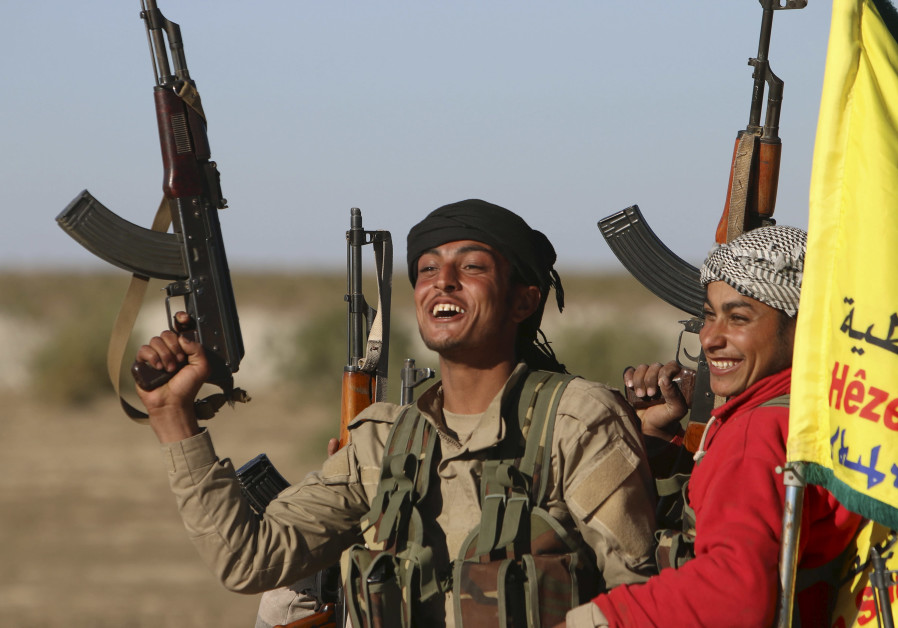A video posted on December 25 showed members of a convoy of Ahrar al-Sharqiya, a Syrian rebel group that has arrived near Manbij in northern Syria with hopes of fighting against the Kurdish forces.

Turkey has vowed to launch a military operation against areas controlled by the mostly Kurdish Syrian Democratic Forces (SDF) in northern Syria. Turkey says it is fighting “terrorism” in its operation, however many locals are concerned that Turkish-backed Syrian rebels who seek to join the Turkish operation contain extremists in their ranks.
A video posted on December 25 showed members of a convoy of Ahrar al-Sharqiya, a Syrian rebel group that has arrived near Manbij in northern Syria with hopes of fighting against the Kurdish forces. Manbij is controlled by the SDF which was aiding the US-led Coalition against ISIS. It was liberated from ISIS in 2016. However the members of Ahrar al-Sharqiya say they are heading towards Manbij to “start the battle east of the Euphrates,” a reference to the river east of Manbij. The cameraman asks the armed men, whose faces are covered, to say a word about the upcoming battle. “Allah willing, we’re going to Manbij, and Raqqa and by Allah also to Hasaka.” These are cities that were liberated from ISIS by the SDF between 2015 and 2017. Raqqa was the former capital of ISIS. They say that they are going to fight the PKK or Kurdistan Workers Party. This is a reference to Turkey’s assertion that the SDF is linked to the PKK.
The video shows one man raise a knife up to indicate that he will kill the PKK members that they plan to fight. This conjures up images of jihadist and extremist videos in the past in Syria, Iraq and other places. Many Kurds on social media and supporters of the SDF now highlight the potential for human rights violations if extremist groups are permitted to take part in the Turkish offensive under the guise of fighting the PKK. For instance, an article at Ahval points to similar abuses after Turkish-backed Syrian rebel fighters attacked the Kurdish area of Afrin in March of this year. “The city was looted by Turkey-backed rebels. Kurds from all backgrounds were harassed, kidnapped and forced to pay ransom.” Prime Minister Benjamin Netanyahu expressed similar concerns on December 22, accusing Turkey of “massacres [of] women and children in Kurdish villages, inside and outside Turkey.”
In the buildup to Turkey’s threatened operation up to 15,000 Syrian rebels have said they would support Turkey militarily. These are groups that originally were created to fight against the Syrian regime of Bashar al-Assad. However they have recently focused on fighting the Kurdish People’s Protection Units (YPG) in Afrin, and now seek to help take areas of eastern Syria from the SDF. This is partly because Turkey signed a deal with Russia in September creating a ceasefire in the rebel-held area of Idlib. This leaves the armed rebel groups with no goal and certainly no chance of any victory over the Syrian regime. With Turkish backing however they can play a role in battles for places like Manbij. Ahrar al-Sharqiya, for instance, has threatened to attack the SDF and Manbij in the past. It has also clashed with other Syrian rebel groups and been accused of assaulting civilians in Afrin.
While many Kurds and supporters of the SDF raise concerns about these kinds of extremist groups, others in Syria who support the Syrian regime also argue that rebel groups shouldn’t be allowed to take over eastern Syria, but that the regime should instead. Asked if Christians in eastern Syria are concerned that these groups might attack, one supporter of the regime noted “no they wouldn’t want Sultan Murad [a Syrian rebel group] and Ahrar Sharqiya in Qamishli [in eastern Syria], but why would they want the YPG/PKK n Qamishli? The Christians in Qamishli want the SAA [Syrian Arab Army] back.” The SAA is the Syrian regime’s army.
Turkey says that its goal in any upcoming military operation is to push out the PKK and bring stability to the border areas of northern and eastern Syria. “We are determined to turn the east of the Euphrates into a peaceful and livable place for its true owners just like the other areas we have made secure in Syria,” Turkish President Recep Tayyip Erdogan said on December 12. Turkish media has highlighted the desire of Arab refugees who fled ISIS in eastern Syria and want to return home to towns such as Tel Abyad. Anadolu even highlighted some Kurds who fled to Turkey who oppose the PKK and want to return to eastern Syria. Turkish media seeks to portray this as a unified operation against terror, not against Kurds.
However the images of Free Syrian Army fighters, often members of the new Turkish-backed National Army or Jaysh al-Watani, waving AK-47s and with Sunni religious-style banners reminiscent of extremist groups, gathering near Manbij belie the claims of this being solely an anti-PKK operation. An article at Hurriyet shows men in trucks, wearing religious slogans on bandanas on their heads and covering their faces. It looks more like a Taliban video from Afghanistan than an anti-terrorist force.
The US is coordinating its withdrawal with Turkey. France has said it may remain in Manbij, which has led Turkey and the Syrian rebels to condemn France. Russia, which backs the Syrian regime, said that according to international law the Syrian government should control the areas the US is withdrawing from. However Russia is also coordinating closely with Ankara, hosting a delegation from Turkey and saying it will coordinate with “Turkish colleagues,” according to the Russian foreign ministry.
As reported by The Jerusalem Post
